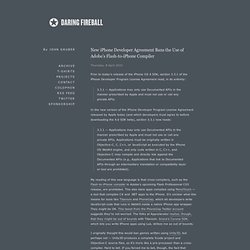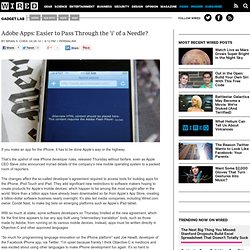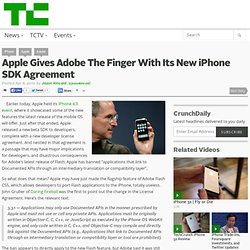

New iPhone Developer Agreement Bans the Use of. Thursday, 8 April 2010 Prior to today’s release of the iPhone OS 4 SDK, section 3.3.1 of the iPhone Developer Program License Agreement read, in its entirety: 3.3.1 — Applications may only use Documented APIs in the manner prescribed by Apple and must not use or call any private APIs.

In the new version of the iPhone Developer Program License Agreement released by Apple today (and which developers must agree to before downloading the 4.0 SDK beta), section 3.3.1 now reads: 3.3.1 — Applications may only use Documented APIs in the manner prescribed by Apple and must not use or call any private APIs. Applications must be originally written in Objective-C, C, C++, or JavaScript as executed by the iPhone OS WebKit engine, and only code written in C, C++, and Objective-C may compile and directly link against the Documented APIs (e.g., Applications that link to Documented APIs through an intermediary translation or compatibility layer or tool are prohibited). Adobe Apps: Easier to Pass Through the ‘i’ of a Needle? If you make an app for the iPhone, it has to be done Apple’s way or the highway.

That’s the upshot of new iPhone developer rules, released Thursday without fanfare, even as Apple CEO Steve Jobs announced myriad details of the company’s new mobile operating system to a packed room of reporters. The changes affect the so-called developer’s agreement required to access tools for building apps for the iPhone, iPod Touch and iPad. They add significant new restrictions to software makers hoping to create products for Apple’s mobile devices, which happen to be among the most sought-after in the world. More than a billion apps have already been downloaded so far from Apple’s App Store, creating a billion-dollar software business nearly overnight.
It’s also led media companies, including Wired.com owner Condé Nast, to make big bets on emerging platforms such as Apple’s iPad tablet. But Apple’s grip over the iPhone has not loosened — and on Thursday appeared to tighten considerably. See Also: Apple Gives Adobe The Finger With Its New iPhone SDK Agreement. Earlier today, Apple held its iPhone 4.0 event, where it showcased some of the new features the latest release of the mobile OS will offer.

Just after that ended, Apple released a new beta SDK to developers, complete with a new developer license agreement. And nestled in that agreement is a passage that may have major implications for developers, and disastrous consequences for Adobe’s latest release of Flash: Apple has banned “applications that link to Documented APIs through an intermediary translation or compatibility layer”. So what does that mean? Apple may have just made the flagship feature of Adobe Flash CS5, which allows developers to port Flash applications to the iPhone, totally useless. John Gruber of Daring Fireball was the first to point out the change in the License Agreement. 3.3.1 — Applications may only use Documented APIs in the manner prescribed by Apple and must not use or call any private APIs.
“We are aware of the new SDK language and are looking into it.